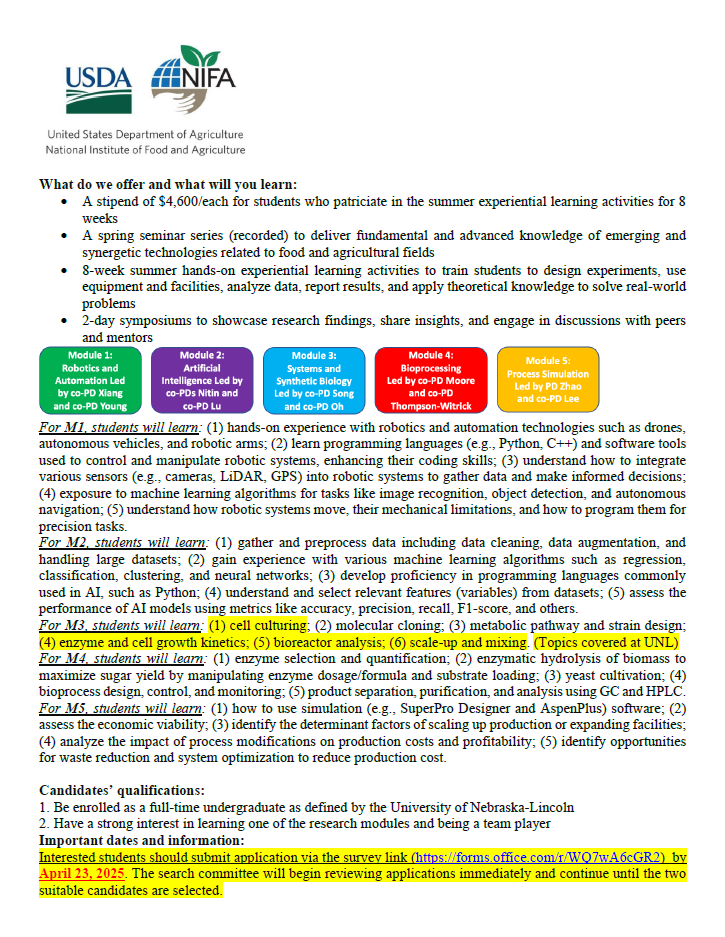
The program aims to foster and train a group of knowledgeable, engaged, and empowered workforce who are committed to applying emerging and synergetic technologies to address a broad range of challenges in the food and agricultural fields.
What do we offer and what will you learn:
• A stipend of $4,600/each for students who patriciate in the summer experiential learning activities for 8 weeks
• A spring seminar series (recorded) to deliver fundamental and advanced knowledge of emerging and synergetic technologies related to food and agricultural fields
• 8-week summer hands-on experiential learning activities to train students to design experiments, use equipment and facilities, analyze data, report results, and apply theoretical knowledge to solve real-world problems
• 2-day symposiums to showcase research findings, share insights, and engage in discussions with peers and mentors
There are five modules:
For M1, students will learn: (1) hands-on experience with robotics and automation technologies such as drones, autonomous vehicles, and robotic arms; (2) learn programming languages (e.g., Python, C++) and software tools used to control and manipulate robotic systems, enhancing their coding skills; (3) understand how to integrate various sensors (e.g., cameras, LiDAR, GPS) into robotic systems to gather data and make informed decisions; (4) exposure to machine learning algorithms for tasks like image recognition, object detection, and autonomous navigation; (5) understand how robotic systems move, their mechanical limitations, and how to program them for precision tasks.
For M2, students will learn: (1) gather and preprocess data including data cleaning, data augmentation, and handling large datasets; (2) gain experience with various machine learning algorithms such as regression, classification, clustering, and neural networks; (3) develop proficiency in programming languages commonly used in AI, such as Python; (4) understand and select relevant features (variables) from datasets; (5) assess the performance of AI models using metrics like accuracy, precision, recall, F1-score, and others.
For M3, students will learn: (1) cell culturing; (2) molecular cloning; (3) metabolic pathway and strain design; (4) enzyme and cell growth kinetics; (5) bioreactor analysis; (6) scale-up and mixing. (Topics covered at UNL)
For M4, students will learn: (1) enzyme selection and quantification; (2) enzymatic hydrolysis of biomass to maximize sugar yield by manipulating enzyme dosage/formula and substrate loading; (3) yeast cultivation; (4) bioprocess design, control, and monitoring; (5) product separation, purification, and analysis using GC and HPLC.
For M5, students will learn: (1) how to use simulation (e.g., SuperPro Designer and AspenPlus) software; (2) assess the economic viability; (3) identify the determinant factors of scaling up production or expanding facilities; (4) analyze the impact of process modifications on production costs and profitability; (5) identify opportunities for waste reduction and system optimization to reduce production cost.
Candidates’ qualifications:
1. Be enrolled as a full-time undergraduate as defined by the University of Nebraska-Lincoln
2. Have a strong interest in learning one of the research modules and being a team player
Important dates and information: Interested students should submit application via the survey link (below) by April 23, 2025. The search committee will begin reviewing applications immediately and continue until the two suitable candidates are selected.
More details at: https://forms.office.com/r/WQ7wA6cGR2